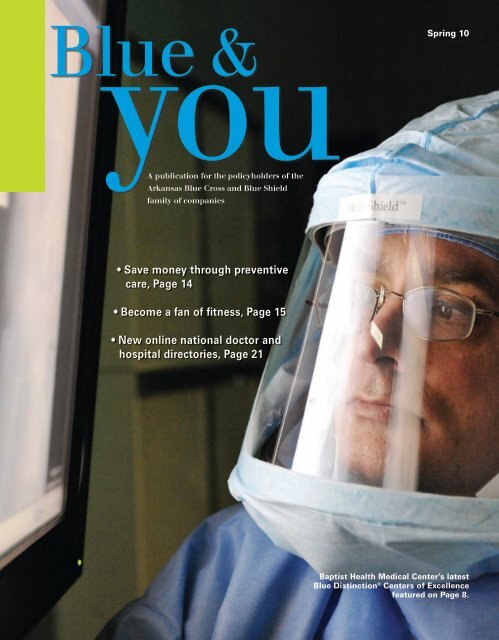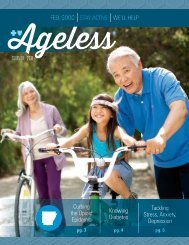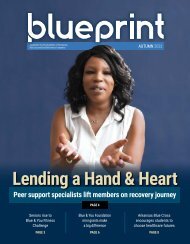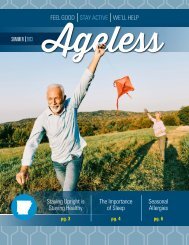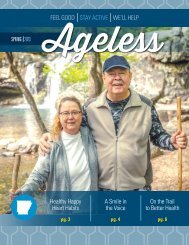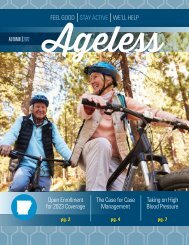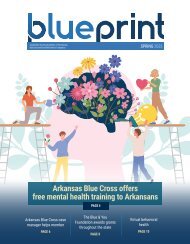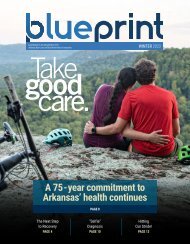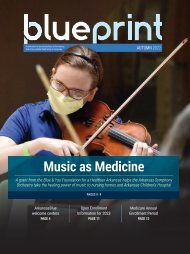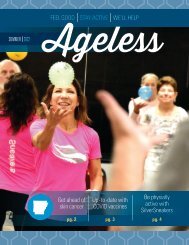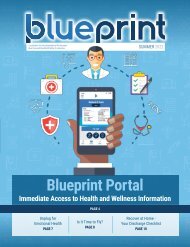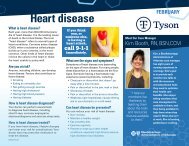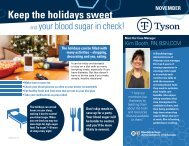Blue & You - Spring 2010
Gift to UAMS promotes primary care, pg. 4 Health Advantage has new Web site design, pg. 7 Dr. David on the impact of diabetes, pg. 10 Blue & You Foundation funds CPR training, pg. 18
Gift to UAMS promotes primary care, pg. 4
Health Advantage has new Web site design, pg. 7
Dr. David on the impact of diabetes, pg. 10
Blue & You Foundation funds CPR training, pg. 18
Create successful ePaper yourself
Turn your PDF publications into a flip-book with our unique Google optimized e-Paper software.
<strong>Spring</strong> 10<br />
A publication for the policyholders of the<br />
Arkansas <strong>Blue</strong> Cross and <strong>Blue</strong> Shield<br />
family of companies<br />
• Save money through preventive<br />
care, Page 14<br />
• Become a fan of fitness, Page 15<br />
• New online national doctor and<br />
hospital directories, Page 21<br />
Baptist Health Medical Center’s latest<br />
<strong>Blue</strong> Distinction ® Centers of Excellence<br />
featured on Page 8.
Charlie and Shirley Rule participate<br />
in the SilverSneakers yoga class at<br />
Fitness Unlimited in Benton.<br />
on Page 22<br />
5 Personal Health Statements<br />
are here<br />
18 Cleaning out your<br />
medicine cabinet<br />
INSIDE<br />
3<br />
4<br />
5<br />
6<br />
7<br />
8<br />
12<br />
13<br />
14<br />
15<br />
16<br />
18<br />
19<br />
20<br />
21<br />
22<br />
23<br />
24<br />
Out of the <strong>Blue</strong><br />
A noteworthy response to the Haitian disaster<br />
Personal Health Statements are here<br />
Certain drugs may increase bleeding in heart<br />
attack patients<br />
Bone-building drugs may lower risk of breast cancer<br />
Chemical in plastics risky?<br />
Three of a Kind: Baptist Health Medical Center<br />
recognized for three <strong>Blue</strong> Distinction ® Centers<br />
of Excellence<br />
Does eating at night cause weight gain?<br />
Lose weight The Healthy Weigh!<br />
Are “comfort foods” really comforting?<br />
What are comfort foods?<br />
Cost Matters: Save money through preventive care<br />
Become a fan of fitness!<br />
Why do resistance exercises?<br />
Lifelong Health with Dr. David<br />
From the Pharmacist —<br />
<strong>Spring</strong> cleaning: <strong>You</strong>r medicine cabinet is calling<br />
The Doctor’s Corner<br />
A Good Investment: The Bank of Lake Village<br />
New online national doctor and hospital directories<br />
Do you cringe at the memory of your teenage years?<br />
Healthy Habits through SilverSneakers ®<br />
Customer Service telephone numbers<br />
Good for you<br />
Cover photo: Baptist Health surgeon, Herbert Hahn, M.D.,<br />
reviews an X-ray before a joint replacement procedure.<br />
<strong>Spring</strong> 10<br />
is published four times a year by<br />
Arkansas <strong>Blue</strong> Cross and <strong>Blue</strong> Shield for<br />
the company’s members, health-care<br />
professionals and other persons<br />
interested in health care and wellness.<br />
Editor: Kelly Whitehorn — BN<strong>You</strong>-Ed@arkbluecross.com<br />
Assistant Editor: Jennifer Gordon<br />
Designer: Gio Bruno Photographer: Chip Bayer<br />
Contributors: Chip Bayer, Matthew Creasman, Damona Fisher, Kristy Fleming,<br />
Trey Hankins, Heather Iacobacci-Miller, Ryan Kravitz, Kathy Luzietti and Mark<br />
Morehead<br />
Vice President, Communications and Product Development: Karen Raley
Out of the<br />
<strong>Blue</strong><br />
A message from our<br />
CEO and President,<br />
Mark White<br />
What’s next for health care reform<br />
As I write this editorial in late February, President Barack<br />
Obama is asking both Democrats and Republicans<br />
to join together for a televised “health-care summit” to<br />
begin another conversation about the future of health<br />
care reform. The President’s agenda for this summit<br />
includes discussion on four topics: insurance reforms,<br />
cost containment, expanding coverage and the impact<br />
health reform legislation will have on deficit reduction.<br />
The President has asked for this new starting point<br />
because the election of a Republican to the Senate took<br />
away the Democrats’ supermajority and put health care<br />
reform almost back to square one. Together, everyone<br />
involved in the health-care industry must develop a balanced<br />
and meaningful approach — an improved healthcare<br />
system that builds on the positive aspects of our<br />
current system.<br />
Our stance on health care reform has not changed.<br />
We support meaningful reform that improves access,<br />
controls costs and improves quality. The rate of growth<br />
in health-care cost is not sustainable in the long term.<br />
We will support responsible changes even if it means<br />
that we, as a health insurance company, must significantly<br />
change the way we do business.<br />
We support the idea that all Americans should have<br />
access to high-quality, affordable health care. Any<br />
reforms should address the issue of the uninsured by<br />
offering financial assistance to those who cannot afford<br />
insurance on their own. For those who have coverage,<br />
we must find ways to effectively control the cost<br />
of medical care and enhance the quality of the care<br />
received.<br />
Without a doubt, increasing cost is the most significant<br />
issue facing health care. It is the primary issue,<br />
and it must be addressed. Cost is the reason why many<br />
Americans do not have health coverage. Cost is why<br />
our current system is unsustainable. True reform must<br />
first address cost. The cost of health-care services<br />
directly impacts your health insurance cost — not the<br />
other way around. In order to slow the growth in costs<br />
our industry must work with consumers, employers,<br />
physicians and hospitals to improve the system.<br />
We must change how we pay health-care providers.<br />
Currently, doctors and hospitals are paid for each<br />
service they provide. We need a system in which doctors<br />
and hospitals are paid to treat a patient’s “medical<br />
episode” rather than each medical service provided.<br />
Expanding health information technology (IT) in the<br />
health-care delivery system will create a more efficient<br />
system (and it is already included in many reform<br />
3<br />
<strong>Blue</strong> & <strong>You</strong> <strong>Spring</strong> <strong>2010</strong>
proposals). We need a system that links the health plan,<br />
the doctor, the hospital and the patient together so that<br />
everyone has access to the information they need to<br />
provide the best treatment for each patient and to get<br />
their claims paid as well.<br />
As the state’s leading health insurance provider, we<br />
will be doing our part to improve the system in Arkansas<br />
and make reform meaningful for everyone, regardless<br />
of what happens in Washington, D.C. We know<br />
that many Americans are satisfied with their insurance<br />
and with the health care they receive, so it makes<br />
sense to build on the system we have, not tear it down<br />
and start again.<br />
Like all of you, we don’t know what will happen with<br />
health care reform. We only know that we work for you<br />
and, on a daily basis, are thinking about what is best<br />
for you … our members. We know that when it comes<br />
to reform, everyone has a role to play … the public and<br />
the private sectors need to work together along with<br />
your input to find solutions that work for everyone.<br />
And most importantly, we know the best way for<br />
reform to be successful and meaningful is if we all take<br />
responsibility for our own health. We should all invest in<br />
our own wellness by committing to healthier lifestyles<br />
so we can all prosper no matter what happens in the<br />
future of health care reform.<br />
4<br />
A noteworthy response to the Haitian disaster<br />
More than $34,000 — that’s how<br />
much the employees of Arkansas<br />
<strong>Blue</strong> Cross and <strong>Blue</strong> Shield raised for<br />
the American Red Cross International<br />
Response Fund (Haiti). Although the<br />
amount may seem quite astonishing to<br />
some, I’m not surprised.<br />
In response to the devastating earthquake<br />
in Haiti, our employees organized<br />
a week-long fund-raising campaign.<br />
They donated food, material items and<br />
talent to raise money through activities<br />
that included bake sales, silent auctions,<br />
benefit luncheons, breakfasts and more.<br />
To boost participation, the employees requested and<br />
received donations including pizza, box lunches, breakfast<br />
bowls, gifts, cosmetics, jewelry, movie tickets,<br />
gift cards and other valuable items from many local<br />
businesses.<br />
I am continually amazed by our employees’ generosity.<br />
Anytime there is a need or an opportunity to do<br />
something of value for the community — whether it’s<br />
Arkansas <strong>Blue</strong> Cross employees have a bake sale to raise funds for Haiti survivors.<br />
just down the street or halfway around the world —<br />
they are ‘all in.’ And, their results are always inspiring.<br />
Raising this money took a whole lot of effort, a whole<br />
lot of energy and a whole lot of heart. It is a privilege to<br />
work with such an incredible team.<br />
To honor their work, Arkansas <strong>Blue</strong> Cross donated<br />
an additional $10,000 in matching funds, for a total of<br />
$44,433 going to the fund.<br />
— Mark White, CEO and president of<br />
Arkansas <strong>Blue</strong> Cross and <strong>Blue</strong> Shield<br />
<strong>Blue</strong> & <strong>You</strong> <strong>Spring</strong> <strong>2010</strong>
Personal Health Statements<br />
are here!<br />
The wait is over — Arkansas <strong>Blue</strong><br />
Cross and <strong>Blue</strong> Shield members began<br />
receiving the new Personal Health Statements<br />
(PHS) in March. The PHS replaces<br />
the traditional Explanation of Benefits<br />
(EOB) health-care benefit statement,<br />
which was generated every time your doctor<br />
or hospital filed a claim.<br />
The PHS is more comprehensive than<br />
the EOB and designed to make claims<br />
processing easier to understand. With the<br />
PHS, industry terms have been rewritten<br />
into everyday language, claims are more<br />
clearly explained, and members will know<br />
exactly where they are with their out-ofpocket<br />
costs (deductibles, copayments, coinsurance<br />
and more). The PHS also gives more information about<br />
health benefits.<br />
“Our members told us through focus groups that<br />
they want to know first and foremost ‘what do I owe?’”<br />
said Karen Raley, vice president of Communications<br />
and Product Development. “So we’ve put this information<br />
in red on the first page.”<br />
In addition, a ‘Benefits at a Glance’ section has been<br />
added so members are reminded of their health benefits.<br />
Charts and graphs should make the information<br />
displayed easier to understand as well.<br />
The PHS also features:<br />
• A better description of the discounts members<br />
receive on their health-care services.<br />
• Information on how to get in touch with us.<br />
• A quick understanding of how much members<br />
owe and to whom.<br />
• Help in understanding the benefits members have<br />
and how they work.<br />
The ‘Benefits at a Glance’ section also shows members<br />
their personal health benefits and tracks where<br />
they are in meeting deductibles and annual coinsurance<br />
maximums. Pharmacy information has been added, including<br />
generic medication recommendations. Another<br />
new feature on the PHS will be personal health messages<br />
and reminders to get health screenings.<br />
Members still have the option to confidentially view<br />
their PHS electronically by signing up for a notification<br />
e-mail through the My <strong>Blue</strong>print member self-service<br />
center. Then, when a new PHS is generated, members<br />
will receive an e-mail.<br />
The new PHS will be issued twice a month instead of<br />
every time a claim is filed. If a member only has pharmacy<br />
claims during a month, the PHS will be issued<br />
quarterly.<br />
The new PHS now is available to all Arkansas <strong>Blue</strong><br />
Cross members and will be available later in the year for<br />
Health Advantage members. “We love to hear from our<br />
members,” said Raley. “Feedback always is welcome on<br />
how the PHS can be improved.”<br />
5<br />
<strong>Blue</strong> & <strong>You</strong> <strong>Spring</strong> <strong>2010</strong>
4 In t h e Ne w s 3<br />
6<br />
Certain drugs may increase<br />
bleeding in heart attack patients<br />
Heart attack patients are treated<br />
with a wide combination of antithrombotic<br />
(blood clot-preventing)<br />
drugs such as aspirin, clopidogrel<br />
and those that reduce the action of<br />
vitamin K. However, there has not<br />
been much research on the safety<br />
of these drug combinations. A new<br />
article suggests that there may be<br />
an increase in bleeding for patients<br />
taking these combinations of drugs.<br />
The medical journal, The Lancet,<br />
states that the study, conducted<br />
by Rikke Sorensen M.D., and colleagues,<br />
suggests that in patients<br />
with heart attacks, risk of hospital<br />
admission for bleeding increased<br />
with the number of these drugs<br />
used. Researchers suggest that<br />
treatment with the aforementioned<br />
drug combinations only be used<br />
after a complete individual risk assessment<br />
has been conducted.<br />
Sources: Medical News Today, The<br />
Lancet<br />
Bone-building drugs<br />
may lower risk of<br />
breast cancer<br />
Women taking bone-building<br />
drugs (bisphosphonates), such as<br />
Boniva or Actonel, may be getting<br />
an added bonus. Two recent studies<br />
suggest that bisphosphonates may<br />
reduce the risks of breast cancer by<br />
one-third.<br />
But don’t run out and ask for a<br />
prescription just yet. Experts say<br />
that these studies are not definitive<br />
and additional research will need<br />
to be done. Eric P. Winer M.D.,<br />
a breast cancer specialist at the<br />
Dana-Farber Cancer Institute in<br />
Boston says, “I don’t think these<br />
studies should be used as a reason<br />
to take a bisphosphonate to prevent<br />
cancer.” He did say, however, “If in<br />
fact you have osteoporosis and you<br />
are taking these drugs, it’s possible<br />
there is an added benefit.”<br />
Sources: The New York Times and<br />
medicinenet.com<br />
<strong>Blue</strong> & <strong>You</strong> <strong>Spring</strong> <strong>2010</strong>
4 In t h e Ne w s 3<br />
Chemical in plastics<br />
risky?<br />
The chemical Bisphenol A (or BPA) is present in many hard plastic bottles<br />
and metal-based food and beverage cans. It has been present since the<br />
1960s, but you may have never even heard of it.<br />
The U.S. Food and Drug Administration (FDA) and the National<br />
Institutes of Health have “some concern” about the possible effects<br />
of BPA on unborn children, infants and young children. For<br />
example, scratched baby bottles and cups should be thrown<br />
away, as they can release BPA if it is present.<br />
Currently, the FDA is continuing in-depth studies to answer<br />
key questions and clarify the uncertainties around the<br />
risks of BPA. In the interim, the FDA is taking reasonable<br />
steps to reduce human exposure to BPA in the food<br />
supply.<br />
These steps include:<br />
• Supporting the industry’s steps to stop producing<br />
BPA-containing baby bottles and infant feeding cups<br />
for the U.S. market.<br />
• Facilitating the development of alternatives to BPA<br />
for the linings of infant formula cans.<br />
• Supporting efforts to replace or minimize BPA levels<br />
in other food can linings.<br />
The FDA does not recommend that families change<br />
the use of infant formula or foods, as the benefit of a<br />
stable source of good nutrition outweighs the potential<br />
risk from BPA exposure.<br />
7<br />
<strong>Blue</strong> & <strong>You</strong> <strong>Spring</strong> <strong>2010</strong>
When a hospital is recognized<br />
as a <strong>Blue</strong> Distinction ® Center<br />
of Excellence for a specific medical<br />
specialty, it is worth noting. When<br />
a hospital gains three such distinc-<br />
8<br />
Three of<br />
a Kind<br />
Baptist Health<br />
Medical Center<br />
recognized for<br />
three <strong>Blue</strong><br />
Distinction<br />
Centers of<br />
Excellence<br />
tions, like Baptist Health Medical<br />
Center in Little Rock, it is worth<br />
stopping and taking a closer look.<br />
Baptist Health has been a <strong>Blue</strong><br />
Distinction Center for Cardiac Care<br />
for more than a year, but it also is<br />
now a <strong>Blue</strong> Distinction Center for<br />
spine surgery and for hip and knee<br />
replacement. Just what is going on<br />
at Baptist Health Medical Center to<br />
promote such excellent care?<br />
“I think our success here at<br />
Baptist Health is due to a combination<br />
of things,” said Doug Weeks,<br />
senior vice-president and administrator<br />
of Baptist Health Medical<br />
Center in Little Rock. “Our excellent<br />
doctors and our compassionate<br />
caregivers combined with the<br />
latest technology and surgical approaches<br />
have helped us remain as<br />
Arkansas’ most preferred healthcare<br />
provider.”<br />
What is a <strong>Blue</strong> Distinction<br />
Center?<br />
<strong>Blue</strong> Distinction Centers of<br />
Excellence must meet high quality<br />
standards established by an expert<br />
Jason Tullis, M.D., a<br />
spine neurosurgeon<br />
with Baptist Health<br />
Medical Center.<br />
panel of physicians, surgeons and<br />
other health-care professionals.<br />
When a hospital has been desig-<br />
<strong>Blue</strong> & <strong>You</strong> <strong>Spring</strong> <strong>2010</strong>
nated a <strong>Blue</strong> Distinction Center, you know they have he was walking, with the help of a walker, down the<br />
expertise in that specialty, that they focus on quality hall! How was that possible?<br />
and that they have a history of patients with positive Dr. Hahn explained that the team of Baptist Health<br />
outcomes. Hospitals provide care differently, and the and OrthoArkansas has worked for years together in<br />
<strong>Blue</strong> Cross system has created a process where hospitals<br />
can demonstrate their expertise.<br />
entire program from admissions to discharge, allow-<br />
refining joint replacement protocols and integrating the<br />
Arkansas <strong>Blue</strong> Cross and <strong>Blue</strong> Shield recognized ing the staff to provide efficient, optimum care. “What<br />
Baptist Health’s cardiac care program in its spring 2009 makes this work is the people,” Dr. Hahn said. “Baptist<br />
issue of <strong>Blue</strong> & <strong>You</strong>. Let’s take a look at the newly has attracted quality people across the spectrum<br />
recognized areas of hip and knee replacement and of care.”<br />
spine surgery.<br />
There are potential serious complications with joint<br />
replacements, particularly blood clots in the deep veins<br />
Hip/Knee Replacement<br />
of the legs or pelvis (thrombosis) and blocked artery in<br />
Rocky Hodges knows a thing or two about surgery.<br />
the lungs caused by a blood clot (pulmonary emboli). To<br />
Not only is he a registered nurse, he’s been the director<br />
of peri-operative services at Baptist Health Medical<br />
avoid complications, Dr. Hahn said the hip/knee team is<br />
aggressive at getting a patient up and moving as soon<br />
Center in Little Rock for 11 years, overseeing everything<br />
as possible after surgery. The movement keeps blood<br />
from pre-op to recovery. So when it was his turn to be a<br />
clots from forming, and it gives the patient a “sense of<br />
patient, he wanted everything to go perfectly. He could<br />
self, so they don’t think of themselves as crippled.” In<br />
have chosen any hospital, but knowing the quality of<br />
order to keep the pain to a minimum, the surgery site<br />
care he saw day to day, “I wouldn’t have had this done<br />
is bathed in a long-acting anesthetic. Dr. Hahn said that<br />
anywhere else.”<br />
allows the patient to wake up and become active and<br />
In February 2009, Rocky, 56, started to have<br />
trouble with his right hip, a real problem for<br />
someone in such a fast-paced work environment.<br />
By June, he was in constant pain and it<br />
was obvious he needed medical intervention.<br />
Through OrthoArkansas, Rocky was diagnosed<br />
with a cartilage tear and arthritis in the hip joint.<br />
More conservative types of treatment were<br />
tried and exhausted, but by December Rocky<br />
was still limping and an X-ray proved what he<br />
already suspected — he needed a total joint<br />
replacement.<br />
Rocky chose Herbert Hahn, M.D., to do the<br />
surgery on Jan. 6, <strong>2010</strong>. The surgery began at 7:30 a.m.<br />
and by 10 a.m. he was in his hospital room. By 3 p.m.<br />
Herbert Hahn, M.D., and Jason Tullis, M.D.<br />
allows the medical team to stay “ahead of the pain.”<br />
“It didn’t hold any fear for me,” Rocky said thinking<br />
back on it, adding that “Dr. Hahn is excellent and my<br />
9<br />
<strong>Blue</strong> & <strong>You</strong> <strong>Spring</strong> <strong>2010</strong>
10<br />
Rocky Hodges works<br />
with his therapist,<br />
Melissa Harklay.<br />
staff is the best.” He has been working with a therapist<br />
at home, working to remove the limp that has affected<br />
his gait for more than a year. When it came to being<br />
a patient, Rocky said he knew he wouldn’t get preferential<br />
treatment at<br />
“Dr. Hahn is excellent and<br />
Baptist, though the<br />
my staff is the best,” said<br />
conversations were<br />
Rocky Hodges.<br />
a bit different. However,<br />
being an employee does have its perks — he got<br />
a copy of his X-ray on his smart phone!<br />
Spine Surgery<br />
Cindy Mahan loves technology. As a mathematics<br />
and physical science teacher at Riverview High School<br />
in Searcy, she is always looking for new tools in order<br />
to present information to her students. So when her<br />
back pain became intolerable, she was delighted to<br />
receive the latest technology through Baptist Health<br />
Medical Center.<br />
For at least 30 years, Cindy suffered with back pain<br />
without knowing why. She went to several doctors<br />
without diagnosis. By February 2008, at 57 years old,<br />
she was still teaching, but her legs were going numb<br />
and she had to sit as she taught her classes. She was<br />
slowly losing the ability to do the work she loved.<br />
Cindy’s primary care physician suggested she visit<br />
with Jason Tullis, M.D., a spine neurosurgeon with<br />
Baptist Health Medical Center who had begun doing<br />
consultations in Searcy. “The first tests he did … he<br />
didn’t find a lot,” Cindy said of Dr. Tullis, “but that’s what<br />
makes him different. He was extremely compassionate<br />
and realized there was more to this problem.”<br />
Finally, an MRI and CT scan picked up what years of<br />
X-rays had not. Cindy had a vertebra that was repeatedly<br />
fracturing and healing. Cindy and Dr. Tullis discussed<br />
the situation and determined that she needed surgery<br />
to finally give her lower back the support it needed.<br />
Cindy was concerned that the surgery would be<br />
intrusive and take a long time to heal, taking her away<br />
from the classroom, but Dr. Tullis put her mind at ease.<br />
Using the latest technology and years of experience,<br />
he was able to adapt techniques to create a surgical<br />
plan just for Cindy. “Every surgery is modified to each<br />
patient. Everyone is different,” he said.<br />
Dr. Tullis said the Neurosurgical Spine Center at<br />
Baptist Health recognizes that not only is the spine the<br />
basis of support for the entire body, it also is a conduit<br />
that sends information throughout the body. He said<br />
that while some surgeons may sub-specialize, he has a<br />
holistic view of how the spine functions and works on<br />
<strong>Blue</strong> & <strong>You</strong> <strong>Spring</strong> <strong>2010</strong>
issues varying from structural issues, to damage to the school year when her activity loosened a screw that<br />
spinal tissue to tumors, from the base of the spine all had to be removed. “My husband said his hardest job<br />
the way up into the head.<br />
was stopping me from doing too much.”<br />
Dr. Tullis said spine neurosurgeons<br />
have to be dedicated to solving problems<br />
and must have honest conversations<br />
with their patients, balancing the<br />
treatment options and risks with the<br />
intensity of the disease. While some<br />
people may heal over time from back<br />
injuries, others may lose their careers<br />
or risk nerve damage by letting a<br />
condition continue. The Neurosurgical<br />
Spine Center at Baptist Health<br />
Cindy Mahan instructs<br />
one of her mathematics<br />
students, Tevin Larry, at<br />
combines the latest technology with a<br />
Riverview High School<br />
team of dedicated surgeons and support<br />
staff, making it a <strong>Blue</strong> Distinction<br />
in Searcy.<br />
Cindy’s surgery was scheduled a few days after Center of Excellence.<br />
school let out for the summer. She said Dr. Tullis made<br />
Find your <strong>Blue</strong> Distinction Center of<br />
two, two-inch incisions to support her spine with rods<br />
Excellence<br />
and screws. By moving “[Dr. Tullis]<br />
For Rocky and Cindy, Baptist Health has renewed<br />
the muscle instead of was extremely<br />
their lives and livelihoods. If you are looking for a hospital<br />
with a <strong>Blue</strong> Distinction designation, go to our Web<br />
cutting, he reduced her<br />
compassionate and<br />
pain and healing. While<br />
realized there was more sites and visit our “Members” section. We do the work<br />
in surgery, Dr. Tullis discovered<br />
another cause<br />
to this problem,” said for you, so you can be assured you are receiving the<br />
Cindy Mahan. best care possible.<br />
of Cindy’s back issues<br />
— a vertebra had not formed properly at birth, creating<br />
weakness. “Three days later I was comfortably walking<br />
down the hall at the hospital and they let me go home,”<br />
she said.<br />
Cindy said she was determined to be<br />
ready to teach when school started again. Go to <strong>Blue</strong> & <strong>You</strong> Online on our Arkansas<br />
She had to go to a teaching in-service six <strong>Blue</strong> Cross and Health Advantage Web sites<br />
weeks after the surgery and was fine.<br />
for more on our <strong>Blue</strong> Distinction Centers.<br />
She did suffer a small setback during the<br />
11<br />
<strong>Blue</strong> & <strong>You</strong> <strong>Spring</strong> <strong>2010</strong>
12<br />
Does eating at night cause<br />
weight gain?<br />
Is it really true that a midnight snack will pile up around your middle<br />
more quickly than if you had eaten it hours earlier?<br />
The reasoning behind this belief is this: All those calories enter your<br />
system right before you go to bed. While sleeping, those calories build<br />
into fat instead of burning off because you are not being active. And,<br />
while that seems to make sense, the truth is that this belief is largely<br />
a myth.<br />
The fact is your body burns fat even while you sleep. The secret to<br />
avoiding weight gain is a simple matter of mathematics. Burn the calories<br />
you consume. If you take in more calories than you burn off you<br />
will gain weight, regardless of when you take in those calories.<br />
Or, to put it simply, eat less, exercise more and do it for the rest of<br />
your life.<br />
Lose<br />
weight<br />
The Healthy<br />
Weigh!<br />
The Healthy Weigh! Education<br />
Program is free for members of<br />
Arkansas <strong>Blue</strong> Cross and <strong>Blue</strong> Shield,<br />
Health Advantage (except state and<br />
public school employees*), <strong>Blue</strong> Cross<br />
and <strong>Blue</strong> Shield Service Benefit Plan<br />
(Federal Employee Program), Medi-Pak<br />
Advantage (PFFS) and eligible members<br />
of <strong>Blue</strong>Advantage Administrators<br />
of Arkansas.<br />
To enroll, complete the attached<br />
enrollment form and return it in the<br />
self-addressed, postage-paid envelope<br />
included in this magazine. The program<br />
starts when you enroll.<br />
After enrollment, you will begin to<br />
receive information through the mail,<br />
which you can read in the privacy of<br />
your own home and at your own pace.<br />
The program is completely voluntary,<br />
and you may leave the program at any<br />
time. If you have further questions<br />
about the program, call the Health<br />
Education Program’s toll-free number<br />
at 1-800-686-2609.<br />
* Our state and public school members can<br />
access the “Nourish” program through<br />
Life Synch.<br />
Simply complete, sign and return the<br />
attached enrollment form in the selfaddressed,<br />
postage-paid envelope.<br />
<strong>Blue</strong> & <strong>You</strong> <strong>Spring</strong> <strong>2010</strong>
Are “comfort foods” really<br />
comforting?<br />
When you are<br />
a little stressed,<br />
do you long for<br />
your mom’s<br />
homemade<br />
pancakes dripping<br />
with maple syrup?<br />
Or, maybe just two,<br />
three or a dozen of your grandma’s homemade chocolate<br />
chip cookies? If you believe what you have read for<br />
years, you probably think you are prone to reach for the<br />
familiar — however, that is not as likely as you might<br />
believe.<br />
A new study from the University of South Carolina recently<br />
tested the “comfort food” theory and you might<br />
be surprised at what they found. During the course<br />
of the study, the research showed that as stress and<br />
change increased — individuals tended to pick often<br />
unfamiliar, even healthier foods and lifestyle options.<br />
More research is needed to explain why the comfort<br />
food theory may be a fallacy. However, the research<br />
upends the notion that people turn to the familiar when<br />
their lives are undergoing transformation such as the<br />
loss of a job, getting a new job, a relocation or the birth<br />
of a child. Maybe, these are the times in people’s lives<br />
when they are more open to change.<br />
Source: Journal of Consumer Research,<br />
September 2009<br />
13<br />
What are<br />
comfort foods?<br />
Comfort foods are simple foods that remind us of our<br />
childhood. Surveys list the following as many of our<br />
favorite comfort foods: peanut butter and jelly, grilled<br />
cheese sandwiches, meatloaf and mashed potatoes,<br />
macaroni and cheese, beef stew and apple pie just to<br />
name a few!<br />
Remember, if you think you need comforting<br />
from some comfort foods — try something a<br />
little different. Look for low-fat substitutes or healthier<br />
options. There are lots of healthy recipe options on the Internet<br />
— just visit the American Heart Association’s recipe Web<br />
site, deliciousdecisions.org.<br />
<strong>Blue</strong> & <strong>You</strong> <strong>Spring</strong> <strong>2010</strong>
14<br />
Living with a chronic illness can be devastating to<br />
your livelihood, your family and your pocketbook. While<br />
some illnesses give you little warning, many are the<br />
result of years of poor lifestyle choices.<br />
Preventive care is one way you can avoid costly illnesses.<br />
By getting tested regularly for conditions like<br />
high blood pressure, high cholesterol, high blood sugar<br />
and getting regular immunizations for illnesses like the<br />
flu, you can stay ahead of many illnesses before they<br />
lead to costly medications and procedures.<br />
The most important things you can<br />
do to stay healthy are:<br />
• Get recommended<br />
screening tests.<br />
• Be tobacco free.<br />
• Be physically active.<br />
• Eat a healthy diet.<br />
• Stay at a healthy weight.<br />
• Take preventive medicines if<br />
you need them.<br />
The following are some preventive screening tests<br />
recommended by the U.S. Preventive Services<br />
Task Force.<br />
Men and Women<br />
Obesity: Have your body mass index (BMI) calculated<br />
regularly if you are overweight.<br />
Cholesterol: Men should have their cholesterol<br />
checked regularly starting at age 35; women by age 45.<br />
Have it checked at a younger age if:<br />
• <strong>You</strong> have diabetes.<br />
• <strong>You</strong> have high blood pressure.<br />
• Heart disease runs in your family.<br />
• <strong>You</strong> smoke.<br />
Cost Matters:<br />
Save money through<br />
preventive care<br />
Blood pressure: Have your blood pressure checked at<br />
least every two years. High blood pressure is 140/90 or<br />
higher.<br />
Colorectal cancer: Have a test for colorectal cancer<br />
starting at age 50. <strong>You</strong>r doctor can help you decide<br />
which test is right for you. If you have a family history<br />
of colorectal cancer, you may need to be tested earlier.<br />
Diabetes: Have a test for diabetes if you have high<br />
blood pressure or high cholesterol.<br />
Depression: If you have felt sad, or hopeless over the<br />
last two weeks or have little interest in doing things,<br />
you may be depressed. Talk to your doctor about being<br />
screened for depression.<br />
Sexually transmitted diseases: Talk to your doctor<br />
to see whether you should be tested for sexually<br />
transmitted diseases.<br />
Men Only<br />
Abdominal aortic aneurysm: If you are between<br />
the ages of 65 and 75 and have ever smoked (100 or<br />
more cigarettes during your lifetime), you need to be<br />
screened once for abdominal aortic aneurysm, which<br />
is an abnormally large or swollen blood vessel in your<br />
abdomen.<br />
Women Only<br />
Breast cancer: Have a mammogram every one to two<br />
years starting at age 40.<br />
Cervical cancer: Have a Pap smear every one to three<br />
years from the ages of 21 and 65.<br />
Osteoporosis (thinning of the bones): Have a<br />
bone density test beginning at age 65 to screen for<br />
osteoporosis.<br />
Source: U.S. Preventive Services Task Force<br />
<strong>Blue</strong> & <strong>You</strong> <strong>Spring</strong> <strong>2010</strong>
TM<br />
Become a fan of fitness!<br />
The <strong>Blue</strong> & <strong>You</strong> Fitness Challenge is hyped to announce<br />
that it’s now on Facebook ® and Twitter! Fan us<br />
on Facebook and follow us on Twitter for the latest Fitness<br />
Challenge updates, reminders, events, photos, etc.<br />
(Find us by searching for <strong>Blue</strong> & <strong>You</strong> Fitness Challenge.)<br />
We are excited to join the world of social media and<br />
look forward to building relationships with our participants<br />
and potential fans. Our page on Facebook allows<br />
us to share daily exercise tips and reminders with our<br />
fans. This page also provides a forum for you to share<br />
questions, comments and experiences regarding health<br />
and fitness. Through this page, we hope to keep our<br />
Challenge participants (and anyone else who is interested)<br />
motivated to start and continue a fitness routine<br />
and/or enhance an existing routine. When you follow us<br />
on Twitter (@BYFitChallenge), you also will receive daily<br />
Resistance (weight)<br />
training isn’t just for men.<br />
Research has shown that<br />
there are benefits associated<br />
with resistance<br />
training for everyone<br />
including the elderly.<br />
A new review, which<br />
compiles data from more<br />
than 100 clinical trials,<br />
concludes that progressive<br />
resistance training<br />
can help older people in daily activities, such as climbing<br />
stairs and fixing dinner.<br />
Resistance or weight training is any exercise where<br />
muscles contract against an external resistance to<br />
increase strength, tone, mass and/or muscular endurance.<br />
Here are just some of the added benefits:<br />
exercise tips and BYFitChallenge<br />
reminders.<br />
The <strong>Blue</strong> & <strong>You</strong><br />
Fitness Challenge<br />
is a physical activity<br />
contest during which<br />
participants engage in eligible<br />
cardiovascular exercises for a<br />
three-month time period. The contest<br />
is a way to launch exercise activity<br />
and encourage wellness activities<br />
throughout the year in the workplace<br />
and community. For more<br />
information about the Challenge<br />
visit blueandyoufitnesschallengeark.com.<br />
Why do resistance exercises?<br />
• Resistance exercise can slow down or even reverse<br />
the decline or loss of muscle fibers that occur as we<br />
age by building muscle mass and strength.<br />
• Resistance training builds bone, which is important<br />
for women who are prone to, or have, osteoporosis.<br />
• Research also shows that resistance exercise can<br />
build bone even in the elderly, and more strength<br />
can lead to fewer falls.<br />
• Some evidence suggests that resistance training<br />
may help lower moderately high blood pressure.<br />
• It can raise metabolic rate, which helps you maintain<br />
a proper body weight.<br />
The good news is that it’s never too late to start<br />
resistance training and reap the benefits. But, please<br />
consult your physician before beginning any new exercise<br />
regimen.<br />
Sources: webmd.com and medicinenet.com<br />
®<br />
Facebook is a registered<br />
trademark of Facebook, Inc.<br />
15<br />
<strong>Blue</strong> & <strong>You</strong> <strong>Spring</strong> <strong>2010</strong>
Lifelong Health<br />
with Dr. David<br />
David A. Lipschitz, M.D., Ph.D.<br />
1. Medications are beneficial in relieving<br />
symptoms and curing disease, but all<br />
medications come with side effects.<br />
While side effects vary from very common to very<br />
rare, they always happen. In each case, the benefit of<br />
the drug must outweigh the risks for the medication<br />
to be taken. Consult with your doctor and your pharmacist<br />
to make sure the benefits and risks are fully<br />
understood.<br />
16<br />
2. Do not refuse to take a medication because<br />
you are concerned about side effects.<br />
A patient may say, “I hate to take medications,” or “I<br />
am very sensitive to medications,” or “I always experience<br />
side effects.” It is a mistake to refuse to take a<br />
medication that may be beneficial because you are<br />
concerned about side effects.<br />
10 simple steps for<br />
using your medications<br />
appropriately<br />
The number may surprise you, but an estimated 26<br />
percent of all hospital admissions are due to complications<br />
from prescription drug therapy. Because this<br />
problem is so widespread, we must all take time to<br />
understand how to take the medication for a particular<br />
condition, its intended benefits and possible side effects.<br />
Here are 10 steps that may help:<br />
3. Try to begin one new medication at<br />
a time.<br />
If two or three drugs are started simultaneously and<br />
an adverse reaction occurs, it is often impossible to<br />
identify which of the new drugs is causing the problem.<br />
The only course of action is to discontinue the medications,<br />
leading to insufficient care and more confusion.<br />
Sometimes the nature of the illness is such that a doctor<br />
is forced to prescribe a number of new drugs at a<br />
time. On other occasions, it may not be necessary, so<br />
talk to your physician if he or she prescribes multiple<br />
medications.<br />
4. Consider generic medications first.<br />
Often, patients and physicians use the newest and<br />
most expensive medication. And yet, for almost every<br />
disease, there is a generic drug available that has<br />
proven benefits.<br />
<strong>Blue</strong> & <strong>You</strong> <strong>Spring</strong> <strong>2010</strong>
Editor’s Note: David A. Lipschitz, M.D, Ph.D., is nationally<br />
recognized as a leader in the field of geriatrics.<br />
Arkansas <strong>Blue</strong> Cross and <strong>Blue</strong> Shield is honored to have<br />
him as a contributor to <strong>Blue</strong> & <strong>You</strong> magazine.<br />
5. The more drugs you take, the greater the<br />
risk of side effects.<br />
Side effects increase dramatically if six different pills<br />
are taken per day. If 11 or more pills are taken daily, you<br />
have a 100 percent chance of experiencing adverse side<br />
effects. All pills count when it comes to the risk of side<br />
effects including prescription, over-the-counter, herbal<br />
remedies or dietary supplements.<br />
6. Identify one physician who knows all the<br />
medications you are taking.<br />
Patients with multiple chronic diseases often go<br />
to multiple specialists who focus exclusively on one<br />
particular problem. One physician starts a medication,<br />
and other physicians are reluctant to stop or change<br />
treatment initiated by another physician. Work with<br />
a primary care physician that you respect,<br />
8. Take a complete list of medications to<br />
every doctor’s appointment.<br />
If medications are changed or discontinued by one<br />
doctor, make sure all your other physicians are aware of<br />
the changes.<br />
9. If a medication does not work, tell your<br />
physician and ask if it can be discontinued.<br />
If you are taking a medication that does not appear to<br />
be helping, the only way to find out is for your physician<br />
to stop the drug. If symptoms worsen, the drug always<br />
can be restarted.<br />
10. Compulsively take medications as<br />
prescribed.<br />
One of the single most critical reasons for medication<br />
problems is non-compliance. Always take your<br />
medications as prescribed, and talk to your<br />
and ask that he or she become responsible<br />
for prescribing and monitoring all<br />
medications taken.<br />
7. Use the same pharmacist<br />
whenever possible.<br />
There are so many different medications<br />
on the market today that it is<br />
Always take your<br />
medications as<br />
prescribed, and talk<br />
to your physician<br />
immediately if you are<br />
experiencing a<br />
problem.<br />
physician immediately if you are experiencing<br />
a problem.<br />
Taking multiple drugs leads to<br />
confusion, which can adversely affect<br />
your care. Take this advice and use<br />
it to make sure you get the optimum<br />
benefit from the drugs you have been<br />
impossible for a physician to be fully aware<br />
prescribed.<br />
of all the potential adverse effects, whether the<br />
prescribed drug is ideal, and if one medication is exerting<br />
either a positive or a negative effect on another<br />
medication taken. Fortunately, a pharmacist has access<br />
to a computer-based program that provides a clear list<br />
of all the potential problems of each drug, the possibilities<br />
of interactions with other drugs, and can identify<br />
obvious mistakes (such as prescribing the same drug<br />
twice or prescribing an incorrect medication).<br />
17<br />
<strong>Blue</strong> & <strong>You</strong> <strong>Spring</strong> <strong>2010</strong>
18<br />
<strong>Spring</strong> cleaning:<br />
<strong>You</strong>r medicine cabinet is calling<br />
Did you know that medications<br />
have expiration dates on them?<br />
Medications used beyond their<br />
expiration dates can be less effective<br />
or even harmful. This date is<br />
based on experiments to determine<br />
the safety and efficacy of your<br />
medicine. That is why you should<br />
include your medicine cabinet in<br />
your springtime cleaning ritual. <strong>You</strong><br />
might be surprised how many of<br />
your medications (prescription and<br />
over-the-counter) have expired.<br />
Checking the expiration date on<br />
medication is easy. Prescriptions<br />
will have expiration dates on the<br />
container; over-the-counter products<br />
have expiration dates on the package,<br />
bottle or container. If the date<br />
has passed, or you can’t read the<br />
date, throw it out. Make a note of<br />
any medications that are close to<br />
their expiration date.<br />
According to the Office of National<br />
Drug Control Policy, you<br />
should not flush prescription drugs<br />
down the toilet unless told to do so<br />
Actiq<br />
Methadose<br />
Avinza<br />
Morphine Sulfate<br />
Daytrana<br />
MS Contin<br />
Demerol<br />
Onsolis<br />
Diastat<br />
Opana<br />
Dilaudid<br />
Opana ER<br />
Dolophine<br />
Oramorph SR<br />
Duragesic<br />
Oxycontin<br />
Embeda<br />
Percocet<br />
Fentora<br />
Percodan<br />
Kadian<br />
Xyrem<br />
Methadone Hydrochloride<br />
Some communities have drug<br />
take-back programs through their<br />
household trash and recycling<br />
service. Ask your pharmacist if she/<br />
he knows of any, or call your trash<br />
and recycling service. If there are<br />
no drug take-back programs in your<br />
area, you still can discard your<br />
by your doctor or in the prescription medications safely in your<br />
information. Most medications can household trash.<br />
be thrown away. There are, however,<br />
some medications that could be cations in your household trash by<br />
<strong>You</strong> can safely dispose of medi-<br />
harmful or fatal if used by anyone using the following approach:<br />
other than the intended patient. The 1. Remove all medications from<br />
U.S. Food and Drug Administration their containers.<br />
(FDA), recommends flushing the following<br />
medications:<br />
desirable substances (cat<br />
2. Mix the medications with un-<br />
litter,<br />
used coffee grounds).<br />
3. Put the mixture in a container.<br />
4. Seal the container and put it in<br />
the trash.<br />
5. Remove your name and prescription<br />
numbers from the old<br />
prescription containers before<br />
throwing them out.<br />
Remember to add your medicine<br />
cabinet to your spring cleaning<br />
list. It’s one more step to keeping<br />
yourself and your loved ones (pets<br />
included) safe.<br />
From the<br />
Pharmacist<br />
by Brandon Griffin, Pharm D.,<br />
Arkansas <strong>Blue</strong> Cross and <strong>Blue</strong> Shield<br />
<strong>Blue</strong> & <strong>You</strong> <strong>Spring</strong> <strong>2010</strong>
The<br />
Doctor’s<br />
Corner<br />
to develop multiple sclerosis (MS)<br />
than nonsmokers. People who quit<br />
smoking improve their chances of<br />
by Ray Bredfeldt, M.D.,<br />
Regional Medical Director<br />
Northwest Region, Fayetteville<br />
not developing MS, but they remain<br />
at a higher risk than those who have<br />
never smoked.<br />
was from an increase in heart attacks<br />
and many types of cancer.<br />
Should ovaries be routinely<br />
Can aspirin help those with<br />
colon cancer?<br />
According to a recent study,<br />
people who have colon cancer and<br />
regularly take aspirin are less likely<br />
to die from their cancer than people<br />
who do not. During this 12-year<br />
study, those whose cancer had not<br />
initially spread to other areas of<br />
the body were almost 30 percent<br />
less likely to die if they took aspirin<br />
on a regular basis. The study also<br />
showed that people who took one<br />
regular aspirin per day did somewhat<br />
better than those who took<br />
less that one per day. However,<br />
aspirin does have risks, so patients<br />
also should consult their doctor before<br />
taking it on a regular basis.<br />
Another reason to quit<br />
smoking!<br />
Researchers have found that<br />
smokers are 60 percent more likely<br />
removed during a<br />
hysterectomy? More<br />
evidence says maybe not …<br />
Surgeons often routinely remove<br />
the ovaries during a hysterectomy<br />
because the surgery eliminates<br />
the future risk of ovarian cancer.<br />
Evidence is mounting, however,<br />
that shows this practice does more<br />
harm than good.<br />
A new study reviewed<br />
the outcomes<br />
of 30,000 women<br />
who had a hysterectomy<br />
— half of whom<br />
had their ovaries removed.<br />
The women<br />
who had their ovaries<br />
removed were 12<br />
percent more likely to<br />
die during the next 24<br />
years than those whose<br />
ovaries were left in place.<br />
The increased death rate<br />
Combination of drugs<br />
proves helpful for<br />
Bell’s palsy<br />
Bell’s palsy is a form of temporary<br />
facial paralysis resulting from<br />
damage or trauma to one of the two<br />
facial nerves. According to a recent<br />
study with 2,786 patients with Bell’s<br />
palsy, they are significantly more<br />
likely to have better outcomes if<br />
they are treated with corticosteroids<br />
(such as prednisone and prednisolone).<br />
And, when an antiviral agent<br />
(such as acyclovir) was added, outcomes<br />
were even better.<br />
19<br />
<strong>Blue</strong> & <strong>You</strong> <strong>Spring</strong> <strong>2010</strong>
20<br />
A Good Investment<br />
The Bank of Lake Village has remained with Arkansas <strong>Blue</strong> Cross since 1958<br />
In 1958, Dwight D. Eisenhower was president of<br />
the United States, a first class postage stamp cost<br />
4 cents, and The Bank of Lake Village, Ark., hired Arkansas<br />
<strong>Blue</strong> Cross and <strong>Blue</strong> Shield to provide health<br />
insurance coverage for its employees. A lot of things<br />
have changed since 1958, but one thing hasn’t: The<br />
Bank of Lake Village is still with Arkansas <strong>Blue</strong> Cross.<br />
“Providing health insurance is one of the largest, if<br />
not the largest, benefit we give our employees,” said<br />
Terry Alpe, president of The Bank of Lake Village. “So<br />
it’s a major factor in contributing to the overall cost of<br />
our employee base. It’s reviewed once a year or any<br />
time there are changes regarding increases or decreases<br />
in costs and coverage,” said Alpe.<br />
The bank provides health insurance for about 40<br />
employees from four entities: The Bank of Lake Village,<br />
Jefferson Bank in Mississippi, the Southeast<br />
Arkansas Holding Company and the board of directors.<br />
And, according to Alpe, during the past 50-plus<br />
years Arkansas <strong>Blue</strong> Cross has consistently provided<br />
the best combination of savings and service. Having<br />
a regional office just up the highway in Pine Bluff has<br />
helped, too.<br />
Said Alpe, “I think the representation that has<br />
been provided out of the Pine Bluff office has been<br />
very good.”<br />
“With Judy, especially,” added Rita Chandler, the<br />
bank’s senior vice president, referring to Judy Stephens<br />
who works at the Southeast Regional Office<br />
in Pine Bluff. “She’s been really helpful. She stays in<br />
touch with us.”<br />
The long-term relationship is something that is appreciated<br />
by the employees of the regional office, too.<br />
“We value all of our relationships with our customers,”<br />
said Dwayne Pierce, regional executive for the<br />
Southeast Regional Office, “but when you’ve had a<br />
relationship with a customer for more than 50 years,<br />
it’s more like taking care of family. I take great comfort<br />
in knowing Judy is working with The Bank of Lake<br />
Village and taking care of our family.”<br />
“My experience has been when our people go to<br />
doctors, hospitals, clinics and pharmacies, there has<br />
been a comfort level knowing that they’ve got a good<br />
insurance provider. That they take with them a coverage<br />
that’s readily accepted and well-known is comforting,”<br />
said Alpe. “There are credentials that come<br />
with having Arkansas <strong>Blue</strong> Cross and <strong>Blue</strong> Shield.”<br />
Bank of Lake Village employees<br />
are (front row, left to right) Rita<br />
Chandler, Amanda Murdaugh<br />
and Kim Buckner. (Back row,<br />
left to right) Terry Alpe and<br />
Leslie Shipman.<br />
<strong>Blue</strong> & <strong>You</strong> <strong>Spring</strong> <strong>2010</strong>
New online<br />
national doctor and hospital directories<br />
Finding a doctor or hospital in another state is as<br />
easy as going to the new online directories on the <strong>Blue</strong><br />
Cross and <strong>Blue</strong> Shield Association Web site, bcbs.com.<br />
The new National Doctor and Hospital Finder and the<br />
Federal Employee Program online directory provide Arkansas<br />
<strong>Blue</strong> Cross and <strong>Blue</strong> Shield members with easy<br />
access to the medical care they need, whether they are<br />
searching their own state or across the nation.<br />
Here are just a few features that make searching for<br />
doctors and hospitals easier:<br />
• Simplified searches with fast results by selecting<br />
“Find a Doctor or Hospital” at bcbs.com.<br />
• New “type-ahead” technology that helps spell city<br />
and specialty names.<br />
• Upfront filtering that eliminates searching for provider<br />
data such as affiliations, recognitions and board<br />
certifications.<br />
• Ability to search for individuals and groups/facilities<br />
simultaneously.<br />
• Mobile access through handheld devices.<br />
“The new doctor and hospital finder will make it<br />
much more convenient for members to locate the appropriate<br />
medical attention they need — and not just in<br />
Arkansas, but nationwide,” said Jim Bailey, senior vice<br />
president of National Business and Inter-Plan Relations.<br />
“It’s just one more way the <strong>Blue</strong> Cross and <strong>Blue</strong> Shield<br />
Association is working to improve health care for all<br />
its members.”<br />
Do you cringe at<br />
the memory of<br />
your teenage<br />
years?<br />
21<br />
New research suggests that the social standings of<br />
teenagers has long-term health consequences.<br />
In a study, known as the Stockholm Birth Cohort<br />
Study, researchers noted that the students who reported<br />
lower levels of social acceptance as young teens<br />
tended to have a higher risk of serious health issues as<br />
adults; the same was true for males and females.<br />
Specifically, the study found that children who were<br />
the least popular and powerful at school had more<br />
health problems as adults.<br />
• They were more than four times as likely to require<br />
hospital treatment for hormonal, nutritional and<br />
metabolic diseases as their most popular and powerful<br />
classmates.<br />
• They were more than twice as likely to develop mental<br />
health and behavioral problems, including suicide<br />
attempts and self-harm.<br />
• They also were significantly more likely to develop<br />
drug and alcohol dependency problems, and nine<br />
times more likely to develop heart disease.<br />
Researchers theorize that lower peer status and less<br />
social support results in more negative self-image and<br />
less self-confidence, which in turn could influence the<br />
child’s future ambitions, expectations and choices.<br />
Source: Journal of Epidemiology and Community<br />
Health, September 2009<br />
<strong>Blue</strong> & <strong>You</strong> <strong>Spring</strong> <strong>2010</strong>
22<br />
Healthy Habits<br />
through<br />
SilverSneakers<br />
When you’ve been married for 59 years, you develop<br />
a lot of the same habits.<br />
For Charlie and Shirley Rule, those habits include<br />
fitness, fun and friendship through the SilverSneakers ®<br />
program at Fitness Unlimited in Benton, Ark.<br />
The Rules started participating in the SilverSneakers<br />
program about three years ago when Shirley found a<br />
notice about it in the mail. “I figured Charlie wouldn’t<br />
want to go, but he said he wanted to try it.” The two<br />
have been<br />
Enrollment in<br />
fixtures in the<br />
SilverSneakers<br />
SilverSneakers is a<br />
program ever benefit of Medi-Pak and<br />
since. Membership<br />
in Silver-<br />
Medi-Pak Advantage<br />
(PFFS) coverage.<br />
Sneakers is a<br />
benefit of Medi-Pak and Medi-Pak Advantage (PFFS)<br />
coverage.<br />
The Rules try to go to SilverSneakers classes as<br />
often as four times a week. Charlie provides entertainment<br />
by printing out jokes and funny stories for Barbara<br />
Kane, their instructor, to read out loud at the beginning<br />
of class.<br />
Shirley said she<br />
and Charlie have<br />
both had their<br />
share of surgeries<br />
and medical<br />
problems, and<br />
Charlie (left) sometimes aren’t<br />
and Shirley<br />
Rule (below) confident in their<br />
participate in<br />
stability, but the<br />
the Silver-<br />
Sneakers SilverSneakers<br />
yoga class<br />
at Fitness classes allow<br />
Unlimited in<br />
participants to<br />
Benton.<br />
use a chair to stay<br />
balanced. If they<br />
feel comfortable,<br />
the participants<br />
can stand, but when they are unsure, they can sit. Yoga<br />
movements have been modified to stretch muscles<br />
from a seated position and Shirley said the cardio program<br />
is quite a workout even using a chair.<br />
Barbara said she has seen the improvements her<br />
participants have made by adding exercise to their lives.<br />
<strong>Blue</strong> & <strong>You</strong> <strong>Spring</strong> <strong>2010</strong>
“Everyone says it improves their flexibility and gives<br />
them more energy to do things they want to do in life,”<br />
she said. She said the exercises to loosen the neck<br />
muscles are extremely important for the participants<br />
who still are driving because it keeps them safe on the<br />
road. “Many of them tell me, ‘I almost fell but was able<br />
to catch myself.’”<br />
For Charlie, who retired from the railroad and serviced<br />
both aluminum plants in the area, going to Silver-<br />
Sneakers is a chance to catch up with many friends and<br />
neighbors, “and find out what is going on in the community.”<br />
Shirley said she has tried exercising at home,<br />
but can’t stay motivated. “I like to walk and visit with<br />
people,” she said.<br />
Barbara said the group extends beyond the classroom<br />
and has gotten together for meals and movies<br />
on occasion. For those who have lost their husband or<br />
wife, it may be the only time they get hugs during the<br />
week. “This is a great group,” Barbara said.<br />
For Charlie and Shirley, SilverSneakers is a habit they<br />
will stick with for the fun, fitness and friendship. As<br />
Charlie said, “We hate to miss a class!”<br />
To enroll in SilverSneakers, Medi-Pak and Medi-Pak<br />
Advantage members can go to a participating fitness<br />
center near them and show their ID card. Fitness center<br />
staff will assist with enrollment and provide tours of<br />
the locations. Because new fitness centers are being<br />
added to the program regularly, members can go online<br />
to silversneakers.com to find all participating locations<br />
in Arkansas. <strong>You</strong> also can call customer service to find a<br />
participating location near you.<br />
Go to <strong>Blue</strong> & <strong>You</strong> Online on our Arkansas<br />
<strong>Blue</strong> Cross and Health Advantage Web sites for<br />
more on SilverSneakers.<br />
SilverSneakers ® is a registered mark of Healthways, Inc. The<br />
SilverSneakers Fitness Program is provided by Healthways, Inc.,<br />
which is an independent company that operates separately from<br />
Arkansas <strong>Blue</strong> Cross and <strong>Blue</strong> Shield.<br />
We love to hear from you!<br />
May we help? For customer service, please call:<br />
Little Rock Toll-free<br />
Number (501) Number<br />
Medi-Pak members 378-3062 1-800-338-2312<br />
Medi-Pak Advantage members 1-877-233-7022<br />
Medi-Pak Rx members 1-866-390-3369<br />
Arkansas <strong>Blue</strong> Cross members 378-<strong>2010</strong> 1-800-238-8379<br />
Pharmacy questions 1-800-863-5561<br />
Specialty Rx Pharmacy questions 1-866-295-2779<br />
Health Advantage members 378-2363 1-800-843-1329<br />
Pharmacy questions 1-800-863-5567<br />
<strong>Blue</strong>Advantage members 378-3600 1-888-872-2531<br />
Pharmacy questions 1-888-293-3748<br />
State and Public School members 378-2364 1-800-482-8416<br />
Federal Employee members 378-2531 1-800-482-6655<br />
Looking for health or dental insurance? We can help!<br />
For individuals, families<br />
and those age 65 or older 378-2937 1-800-392-2583<br />
For employer groups 378-3070 1-800-421-1112<br />
(Arkansas <strong>Blue</strong> Cross Group Services, which includes<br />
Health Advantage and <strong>Blue</strong>Advantage Administrators<br />
of Arkansas)<br />
Prefer to speak with someone close to home? Call or visit one<br />
of our regional offices:<br />
Pine Bluff/Southeast Region 1-800-236-0369<br />
1800 West 73rd St.<br />
Jonesboro/Northeast Region 1-800-299-4124<br />
707 East Matthews Ave.<br />
Hot <strong>Spring</strong>s/South Central Region 1-800-588-5733<br />
100 Greenwood Ave., Suite C<br />
Texarkana/Southwest Region 1-800-470-9621<br />
1710 Arkansas Boulevard<br />
Fayetteville/Northwest Region 1-800-817-7726<br />
516 East Milsap Rd., Suite 103<br />
Fort Smith/West Central Region 1-866-254-9117<br />
3501 Old Greenwood Rd., Suite 5<br />
Little Rock/Central Region 1-800-421-1112<br />
320 West Capitol Ave., Suite 900<br />
<strong>You</strong> can contact customer service through our Web sites:<br />
arkansasbluecross.com<br />
healthadvantage-hmo.com<br />
blueadvantagearkansas.com<br />
Related Web sites:<br />
blueandyoufoundationarkansas.org<br />
blueannewe-ark.com<br />
23<br />
<strong>Blue</strong> & <strong>You</strong> <strong>Spring</strong> <strong>2010</strong>
24<br />
At Arkansas <strong>Blue</strong> Cross<br />
and <strong>Blue</strong> Shield, we are<br />
always looking for new<br />
ways to be "Good for <strong>You</strong>."<br />
Here are some of our<br />
latest accomplishments.<br />
See <strong>Blue</strong>Advantage’s new Web site<br />
<strong>Blue</strong>Advantage Administrators of Arkansas has a<br />
new Web site! The new design makes it easy to<br />
navigate and puts the tools you need right at your<br />
fingertips. The “Plans & Products” section is designed<br />
with employer groups in mind to help find<br />
the right health-care coverage for your company.<br />
Links under each tab for Members, Employers and<br />
Providers make finding what you need a snap!<br />
Get claims information online<br />
<strong>You</strong> can receive e-mails to notify you when your<br />
Explanation of Benefits (EOBs) or Personal Health<br />
Statements (PHSs) are available online behind<br />
My <strong>Blue</strong>print, our member self-service center. It’s<br />
convenient, fast and easy! To sign up, you must be<br />
registered for My <strong>Blue</strong>print. If you haven’t already,<br />
go online and follow the easy registration instructions<br />
from the home page of our Web sites.<br />
Do you have a Personal Health Record?<br />
A Personal Health Record (PHR) is a secure, Webbased,<br />
electronic medical record that combines<br />
information provided by you, your doctor and your<br />
insurance company. To set up your PHR, log in to<br />
My <strong>Blue</strong>print, our member self-service center, and<br />
select “Personal Health Record.” <strong>You</strong>r PHR already<br />
includes your medical history, current medications,<br />
medical tests, a summary of your visits to your<br />
doctor and more. <strong>You</strong> can add to the information by<br />
including your personal medical history, family medical<br />
history and social history.<br />
A PHR can be extremely helpful in emergency<br />
situations when you may need a doctor to have<br />
access to your medical history and current medications<br />
in a hurry. Or, by using the Health Trackers,<br />
you can provide your doctors a day-to-day glimpse<br />
at your blood sugar levels, blood pressure and other<br />
vital health statistics.<br />
<strong>Blue</strong> & <strong>You</strong> <strong>Spring</strong> <strong>2010</strong>


